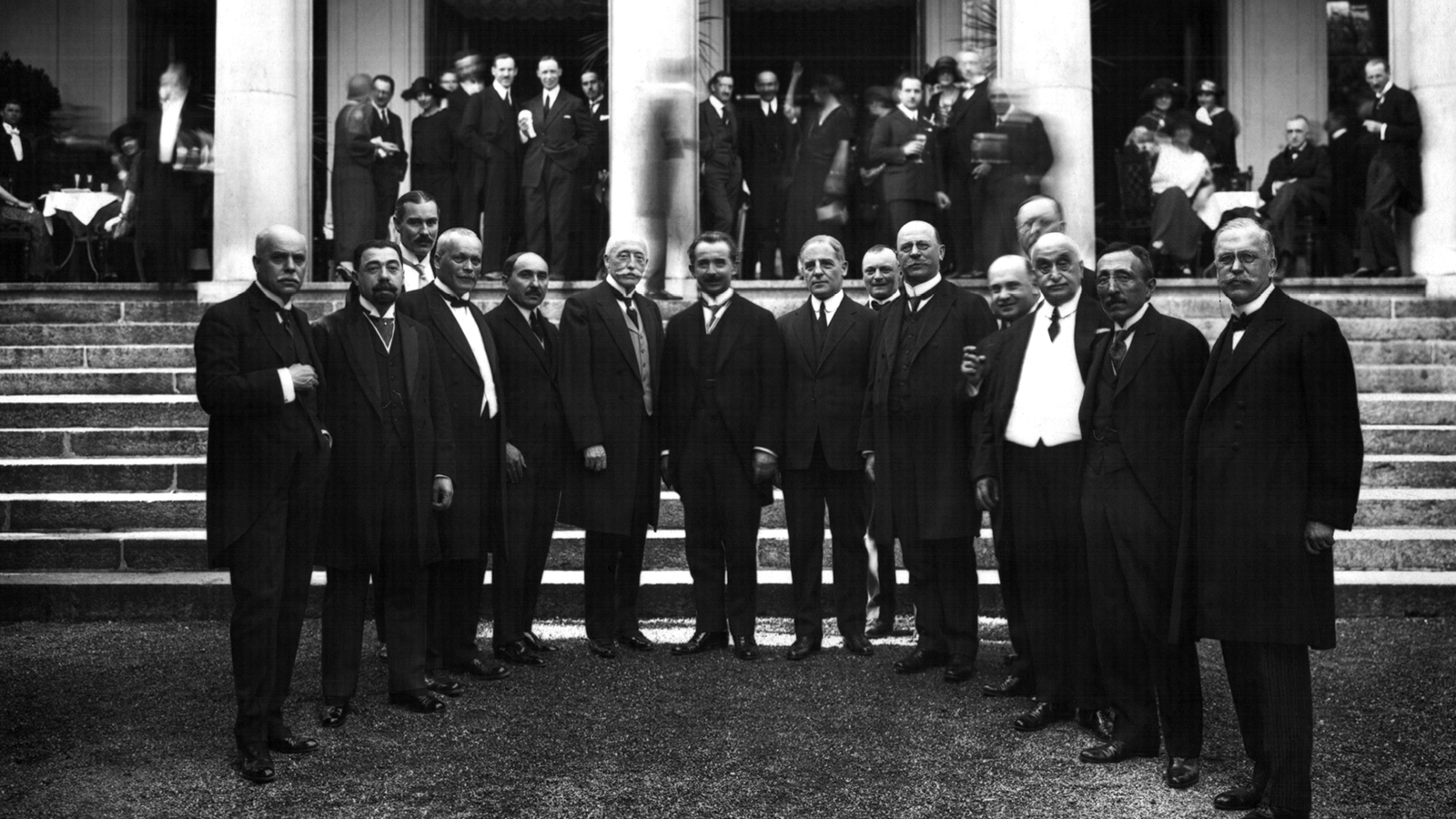Sir Halford Mackinder’s wisdom holds not only a significant mark in escalating
geopolitical discerning but also addresses foreign policy behaviors at the very state level. The world he had created back in 1900 which some may assume hardly resonates with today’s world; one must acknowledge the solid contributions he made to the development of the discipline: political geography. Rarely does it resemble the present world; Mackinder’s map managed to shed light on the minds of other political figures including Haushofer, Ratzel, and Alfred Mahan: “He who controls the heartland, controls the world island.” As well-grounded as Mackinder’s theory is; it may appear to be slightly speculative where some terms have been overlooked. Neither was it ratified enough to explain world history nor was it inclusive to regard certain cases, whether it be in considering the emergence of the U.S. as a global power or evaluating the significance of air power. Rather, Mackinder estimated -perhaps overestimated- the threat of the pivot state: Russia. According to Venier, Mackinder perceived Russia as the major threat while giving little or no importance to Germany where he only saw it as a minor -if not completely secure- trouble. (Venier, 2004)
The paper will expose the role of geography from the theoretical and functional framework of Heartland Theory. Although the theory itself was noticeably in tune with British foreign policy and enabled a codified mode of reasoning to occur, it still aimed to possess people and their natural resources likewise speculations of others such as Ratzel, Mahan, Haushofer, and Kjellen. The clearly shown motive was the concept of world dominance owing to Mackinder’s belief implying who control these assets would become the wealthiest country.
Identifying the Theoretical Limits of Heartland: The Essence
The pivotal nature of the high seas, Central Asia, and Eurasia revealed a unique force dimension for the center of the planet, so argues Mackinder. The so-called area was surrounded by rivers such as Volga, Amu Darya, and Yenisey, although it has been remodeled twice by Mackinder to adopt ongoing geopolitical transformations. (Ismailov, E., Vladimer P. 2010) Parenthetically, Mackinder has never been a fan of the term “geopolitics”. He disliked the concept and instead, he used “geostrategic” discourses in his book. (Tuathail, G. 1996)
Like him, Ratzel did not choose to use geopolitics. In 1899, Rudolf Hess coined the term geopolitics and regarded it as one of the sub-fields of geography. When he acknowledged the term, he defined geopolitics as a geographical organism or phenomenon in space. “Geopolitik” was among the five core policies that states need to apply to be powerful. As the inventor of the term, Rudolf Kjellen was one of the intellectual leading mentors of Hitler. Hence, when we look at how Kjellen treated states as biological organisms as well as geographical beings; it becomes likely for us to see the relatedness with Ratzel, Mackinder, Haushofer, and Mahan.
Not only did he label three separate regions, but Mackinder also had three periods uncovered in Geographical Pivot of History: The pre-Columbian era where the dominance of landing power is identified was followed by the Columbian period. (Mackinder, H.J., 1904) Since the Columbian period has included European imperial expansion; Mackinder foresaw the need for a closed political system for the West. Lastly, the post-Columbian era where the railways have been considered one of the most powerful tools for trade then sea vessels. This enabled some scholars to discuss Mackinder’s focus on mobility. This was a period in which Mackinder solely sought to advocate inland mobility and the significance of railway roads rather than investigating oceanic mobility and thus, it would end up ignoring the potential benefit that a maritime-commercial could bring. (Sloan, G. 2017) Mackinder did not necessarily regard sea vessels to be much practical though seem to presume transcontinental railways to appear with utmost importance. His main concern was to witness Russia’s evolution into a stronger state. Whilst land power prevailed over sea power in the pre-Colombian period according to Mackinder; rail power seemed to be dominating the post-Columbian era. To this extent, Mahan promoted the supremacy of sea power over land power. As he was a naval officer himself, naval superiority laid the groundwork for foreign policy according to him.
Further Exploration of Varied Epochs and Portrayal of Remarkable Figures
Resembling Alfred Mahan, Haushofer approached the state-power axis in a physical sense. By categorizing the power based on “…the size of a country, the racial ―character of its population, as well as its economic and military capacity.” (Flint, C. 2021) This understanding also resonates with realism since the concept of power was dominated by a state‘s capability to wage war with other states. The premises of Mahan, Ratzel, and Haushofer were all formed to justify expansionism in the context of German imperialism.
As significant as Mackinder’s work was, Heartland theory was not the sole central element of using geopolitics for colonial justification. Closely associated with ‘naturality’; Friedrich Ratzel forged ahead the Organic State Theory in 1897. Not only does it broadly draw on Mackinder’s theory but it also extends the living space concept as previously stated. Quote on quote, Charles Kruczewski explained lebensraum as follows: “….which is necessary for guaranteeing the life and development of the German people-physically, politically, and economically. It embraces all kinds of issues based upon prestige, historical and geographical considerations.” (Kruczewski, C. 1940)
Since the territory of a state is neither a definite nor a fixed area, borders are not for granted. Ratzel, at this point, perceived states as ever-changing living organisms. This organic understanding of the state addresses that in the events of possible population growth; the state requires broader territories and richer resources which eventually leads to competition between them to achieve sustainable development. Nourishment was needed to gain political power, so Ratzel claimed. He based German expansion and aggression on a natural sequence of states’ desire to nourish. As a formal student of Ratzel; Karl Haushofer made such a connection when he published “Why Geopolitics?” by establishing a link between Germany’s defeat and the lack of information on geopolitics. By that means Nazi geopolitics has begun to evolve from Haushofer’s geopolitical understanding which I am about to explore in the following section. He also admired Mackinder‘s work, Geopolitical Pivot of History, by saying ―never have I seen anything greater than these few pages of a geopolitical masterwork. ― (Hee, R., 2010) Haushofer was influenced by Mackinder and sought to get public support in popularizing geopolitical dominance. Mackinder is still influential today. We can still read Mackinder’s ideas in Putin’s mind. This answer may contribute to the question above regarding what all these scholars had in common. Nevertheless, the main key similarities are and will be embedded within the text.
Diving into Nazi Geopolitics: To What Extent Nazis were influenced by Haushofer?
At some point in history, Hitler was influenced by the very advocator of lebensraum: Ratzel. According to the notion, domestic sources should not be the sole to be used if a state wants to grow within the international seeing. This, inevitably, became an important justification for colonialism. The geopolitical concepts used by Hitler like “territorial formation,” or “constriction of Lebensraum,” show such shred of evidence. (Herwig, H.2016) The insight also suggests Haushofer’s biased sympathy towards Nazi Party.
He also delivered speeches at Nazi meetings occasionally. (Tuathail, G., 2005) This being the case, it comes as no surprise that some considered Karl Haushofer to be the father of Nazi ideology. Nevertheless, several differences have long existed. Haushofer regarded Great Britain as the ultimate enemy of Germany whereas Bolsheviks were seen as the biggest rival of Germany on the other hand. Carl Schmitt’s implementations of Haushofer’s ideas are also significant to better understanding this correlation. Having the status of a German geopolitician, Schmitt saw ethnic cleansing as related to geopolitics, saying that lands should be cleansed. As a result, the term geopolitics was corrupted. This is candidly to imply that neither did the Europeans wish to promote nor study geopolitics any longer. Keeping in mind that Haushofer was encouraged by Mackinder himself and sought to get public support in popularizing geopolitical dominance; Haushofer established a German academy in 1925 under the name of Institut fur Geopulitik. He held strongly to the idea that control of Eastern Europe would control the heartland which would lead to global dominance. This case also allows us to indicate as much as Haushofer had a bearable impact on Nazi understanding; Mackinder, though indirectly, affected them as well. Haushofer was also under the major influence of Ratzel‘s organic state theory and thus had certain points in common.
Right after geopolitics was used and embraced by Nazis; the term was corrupted. No one in the Western world wished to lean towards geopolitics except for Germany. It was the era of marginalization. Especially after the 1960’s behavior revolution with the rise of electoral geography: not only particular outcomes occur but also the U.S. started to shift its focus on geopolitics again. The motive behind this was the rapprochement towards geopolitics as a methodology. Yet it remains problematic since it filters out several social and ethical questions. The new conveying transition may also fail to engage with the part led by human agency. Then, consequently, Positivist geopolitics started to become apolitical.
Conclusion
Geopolitics has been launching itself on a certain scale ever since it was coined by Kjellen in 1899. Henceforward, the field has been enhanced by figures such as Kjellen, Ratzel, Mackinder, Haushofer, and Mahan. All in all, the position of the state was mainly focused on the domestic and the living structures. A subsequent effort has been shown to explain natural conditions among states regarding which of these states can contribute to the growth. All these founder figures also performed as scientist, soldier, politician and kept on developing formulas about geopolitical competition, land power vs. Sea power duality, changing role of technology. Eventually –if not all– they have contributed to the Nazi understanding of geopolitics.
References
Flint, C. (2021). Introduction to Geopolitics. Routledge. ISBN 9780367686
Hee, R. (2010, June 15). World Conquest: The Heartland Theory of Halford J.
Mackinder. Retrieved from
http://www.argumentations.com/Argumentations/StoryDetail_1040.aspx
Ismailov, E., & Papava, V. (2010). Rethinking Central Eurasia. Central Asia-Caucasus
Institute and Silk Road Studies Program. Johns Hopkins University.
Kruszewski, C. (1940). Germany’s Lebensraum. American Political Science Review,
34(5), 964-975.
Mackinder, H. J. (1904). The geographical pivot of history. The Geographical Journal,
23(4), 421-437.
Tuathail, Ó. (2005). Gearóid (1996) Critical Geopolitics. The Politics of Writing
Global Space. Minneapolis.
Venier, P. (2004). The Geographical Pivot of History and Early Twentieth Century
Geopolitical Culture. The Geographical Journal, 170(4), 330–336.
http://www.jstor.org/stable/3451462












